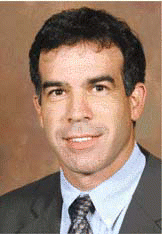Smaller incisions, fewer complications, and a speedy return home are a few of the advantages otolaryngologists can offer by managing their patients on an outpatient basis or using minimally invasive surgical techniques. These new options are appropriate for selected thyroidectomy or parathyroidectomy patients, according to investigators who presented their findings at the American Academy of Otolaryngology-Head and Neck Surgery Foundation Annual Meeting in Toronto last September.
Explore This Issue
February 2007Outpatient Thyroidectomy
For thyroid patients, minimally invasive surgery can often be managed on an outpatient basis, avoiding overnight hospitalization. We found that it is nicer for patients to convalesce in their own home environment, eating their own foods, and surrounded by their family, said David J. Terris, MD, lead investigator of a study that examined the feasibility of outpatient thyroid surgery. Other advantages include minimizing exposure to hospital-acquired infections, reduced potential for iatrogenic complications, and lower costs.
Dr. Terris led a group from the Departments of Otolaryngology-Head and Neck Surgery and Medicine of the Medical College of Georgia in Augusta in examining the safety of efficacy of outpatient versus inpatient thyroid surgery. In a prospective, nonrandomized study of 91 consecutive patients who underwent thyroid surgery between December 2004 and October 2005, 57% of patients (n = 52) had the procedure on an outpatient basis. Twenty-nine percent (n = 25) underwent 23-hour observation with an overnight stay and were considered inpatients. An additional 14% (n = 13) were admitted to the hospital, for a mean of 3.4 ± days. The outpatient and inpatient groups did not differ significantly by age (44.8 ± 13.3 years vs 48.5 ± 16.3 years) or gender (85% female vs 82% female).
Dr. Terris, who is the Porubsky Distinguished Professor and Chairman of the Department of Otolaryngology at the Medical College of Georgia, performed all surgeries. He used a number of surgical techniques, including Kocher incision, minimally invasive thyroid surgery with access to the thyroid compartment, and endoscopic thyroidectomy. Laryngeal nerve monitoring was used as required, and vocal cord mobility was checked preoperatively and again in the postanesthesia care unit or on the ward using flexible fiberoptic laryngoscopy. In the outpatient group, patients were assessed postoperatively and discharged once they became ambulatory, could tolerate food, and could use oral medications to manage pain. All patients returned within one to two weeks for follow-up assessment, and were requested to return after that if needed.
Forty-two patients underwent hemithyroidectomies, 38 underwent total thyroidectomies, and 11 had completion thyroidectomies. Hemithyroidectomies were usually done on an outpatient basis, while patients were admitted to the hospital for total thyroidectomies. Outcome measures included estimated blood loss, duration of surgery, pathology, admission or readmission to the hospital, and hospital charges.

Leave a Reply